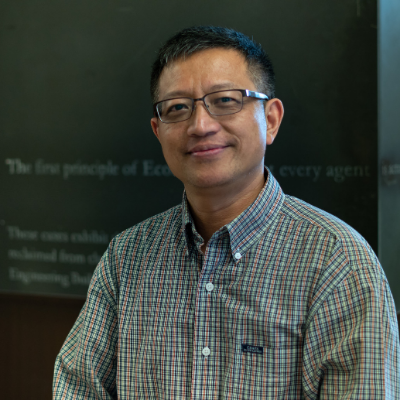By Gita Smith
Job task complexity plays a central role in the development of problem-solving skills by workers, according to research by Haizheng Li, a faculty member of Georgia Tech’s School of Economics. Along with co-author Qinyi Liu at University of International Business and Economics, Beijing. Liu received her PhD in Economics from Georgia Tech in 2018 and Li was her advisor. Li provides new empirical evidence on skill formation via job tasks. The paper focuses on how a worker becomes more productive through learning-by-doing during on-the-job training.
 Li’s approach distinguishes from the literature in three important aspects. First, most studies construct job task measures by matching the occupation-level aggregate task characteristics to tasks performed at work, and this leads to measurement errors. Job tasks at the individual level vary significantly even within occupations. This study goes further and uses information at the individual level to investigate how different tasks affect skill formation.
Li’s approach distinguishes from the literature in three important aspects. First, most studies construct job task measures by matching the occupation-level aggregate task characteristics to tasks performed at work, and this leads to measurement errors. Job tasks at the individual level vary significantly even within occupations. This study goes further and uses information at the individual level to investigate how different tasks affect skill formation.
Second, Li investigates various aspects of human capital (a person’s skills, knowledge, and experience viewed in terms of their value or cost to a company). Li treats tasks performed on the job as a channel of human capital accumulation, investigating the effect of specific tasks on skill formation.
Third, Li measures a worker’s human capital based on a direct assessment of his/her problem-solving skills, noting that wages may not reflect the true returns to task-specific skills when they do not reflect the actual productivity. The paper measures skill at two different levels, general problem-solving and complex problem-solving, to gain understanding of the mechanism of skill formation.
Li and Liu use data from two German surveys: Programme for the International Assessment of Adult Competencies (PIAAC) project and LLLight’in’Europe (LLL) project funded by the European Union. The two datasets complement each other and investigate the effects of job tasks on skill formation at different levels.
Li states, “Our results show that job tasks improve a worker’s problem-solving skills, especially when one frequently performs complex job tasks. Both within-occupation and between-occupation variation in specific job tasks can contribute to skill development. Analytical tasks strongly affect both general problem-solving skills and complex problem-solving skills, while interactive tasks only show an important effect on complex problem-solving skills.”
The results imply that the increasing job task complexity found in many countries can benefit the workforce skill. The findings shed light on employers’ job task design and government training programs for workers. This study also provides useful information to improve a worker’s match with jobs; a good match can enhance a worker’s human capital and career development.
